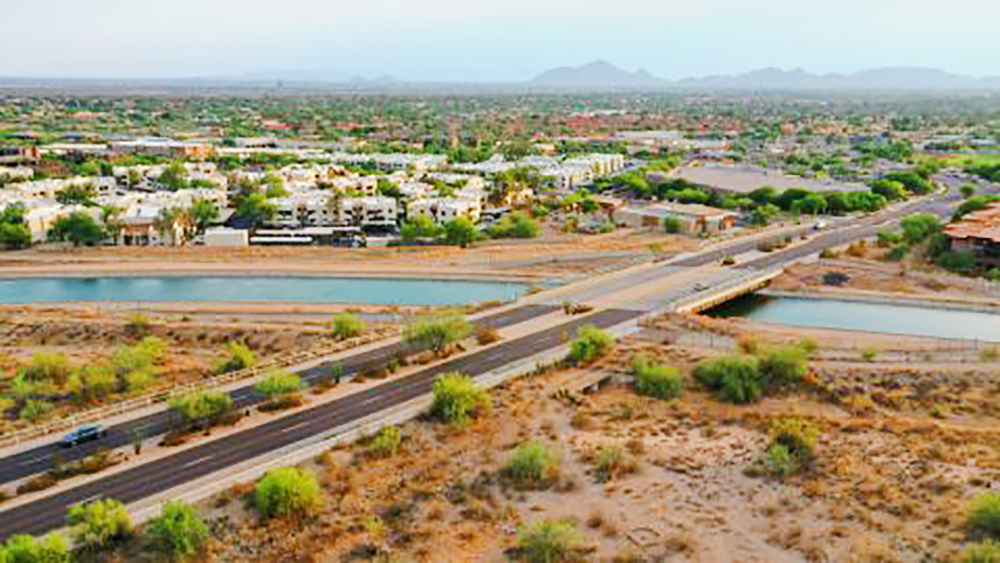The Hayden-Rhodes Aqueduct, fed by the Colorado River, runs through Scottsdale, Arizona./Carolyn Cole/Getty
Smaller cities. Soaring water prices. Scorched desert towns. Arizona confronts a highly uncertain future.
By Keith Schneider | Circle of Blue
On a Saturday morning in late January a chill wind kicks up dust on the high desert ridge north of Scottsdale, Ariz., where wood skeletons of new homes appear above the mesquite and cactus of the Rio Verde Foothills. Along Rio Verde Drive a white tent marks the corner where Karen Nabity and Jennifer Simpson, longtime Foothills residents, collect petition signatures to head off a water emergency bearing down on them and hundreds of their neighbors.
Last year Scottsdale authorities, concerned about the effects of the megadrought and the August 2021 federal Colorado River water shortage declaration, decided to protect the city’s 241,000 residents. They issued an order under Scottsdale’s drought management plan that will bar tanker trucks from using a city-owned depot to haul water to homes outside the city limit. Rio Verde Foothills, where Nabity, Simpson and at least 500 other homeowners rely on the depot for their drinking water, falls into that category. The city set a December 31, 2022 deadline for the water shut off.
Scottsdale’s water shut down and Rio Verde Foothills’ scramble for a new supply is unique to Arizona at the moment. However, the significance of the community’s encounter with the real-life menace of drought and shrinking groundwater reserves is more than a one-off water shortage event. It is a flashing red warning that Arizona’s growth-centered economic determinism is crashing hard into severe ecological constraints.
What’s happening in the million-dollar homes of Rio Verde Foothills, one of the Phoenix metropolitan region’s choice places to live, is a future shock “buyer beware” scenario certain to be replicated over the next several decades in many other Arizona communities contending with urgent water constraints.
Tempe cleaned up and dammed a dry section of the Salt River, filled it with reclaimed water, and in 1999 opened 2 mile-long Town Lake, a signature recreational asset at the heart of the city.Photo © Keith Schneider / Circle of Blue
Another View
About 50 miles south, another scenario of 21st century Arizona is taking shape. The nearly 23,000-member Gila River Indian Community is modernizing: adding to its group of casinos, preparing to expand its irrigated farm acres, and elevating its influence in Arizona’s politics and economy. It’s doing so by virtue of one of the most secure and abundant water supplies in Arizona and the entire Southwest.
Following decades of brutal discrimination and abuse by white settlers and state authorities during which the two Gila River tribes’ rights to their historic water supply were not honored, Congress approved an agreement between the United States and the State of Arizona that essentially guarantees tribal access to 653,500 acre-feet of water per year. That amounts to 213 billion gallons, or three times more water than industry and the 1 million residents of the Tucson metropolitan region use in a year. Almost half, or 311,000 acre-feet, comes from the Colorado River. Much of the rest comes from groundwater and reservoir storage on the Salt, Verde, and Gila rivers east of Phoenix.
Tribal leaders did not respond to requests for interviews. But from previous statements by tribal leaders and in interviews with state water authorities, it is clear that the Gila River Indian Community, or GRIC, is using its abundant water to build a new age of wealth and influence on the 372,000-acre reservation south of Phoenix. GRIC is constructing a federally-financed irrigation network to increase farming operations to 75,000 ancestral acres from the current 35,000. It negotiated lucrative agreements to lease water to Phoenix, Chandler, and other communities. It is also marketing water that it stores in aquifers to willing suburbs and subdivision builders interested in long-term leases.












